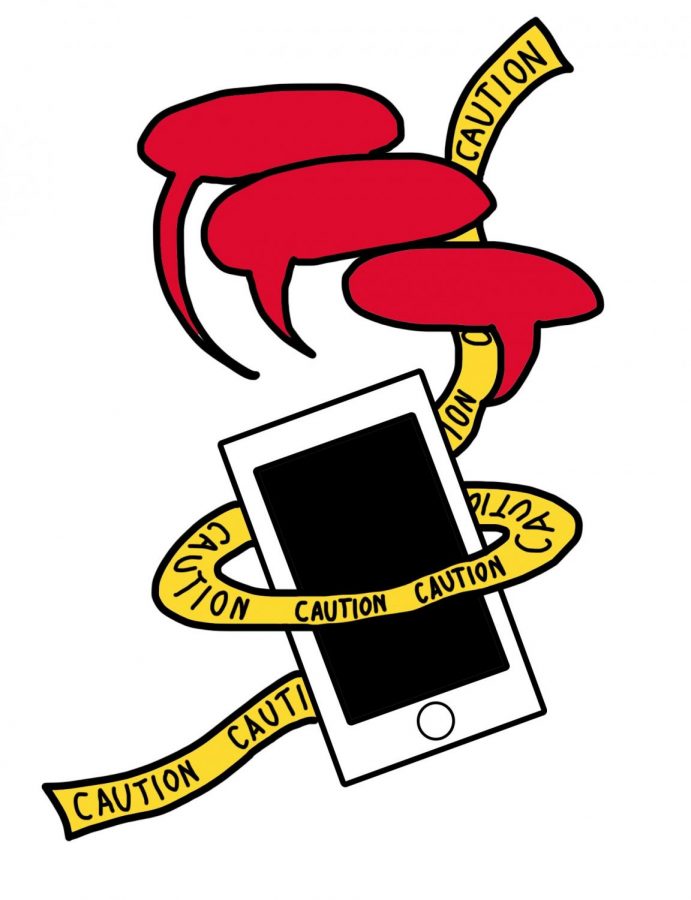Stop Making Offensive Jokes About Coronavirus
April 1, 2020
When faced with life’s challenges, dark humor is a common coping mechanism among millennials and Gen Z. If you log onto any one of your social media accounts these days, it is likely you will come across someone’s attempt to joke about the effects of the coronavirus — but where do we draw the line?
As self-quarantining has forced many people to stay at home, social media quickly became saturated with content attempting to make light of this challenging time. The persistent use of overly morbid, racist and insensitive humor desensitizes others to the effects of the coronavirus and fuels the narrative that it is not something to worry about despite the severe suffering it has caused.
As TikTok is one of the fastest-growing apps in the world with millions of users, content mocking problematic situations that arise from self-quarantining can potentially hurt more people than it can help by normalizing unsafe behaviors. Although some TikTok users spread useful information regarding the disease, many take a more unsettling route by normalizing excessive drinking and troublesome family dynamics that result from self-quarantining. With so much uncertainty surrounding the long-term effects of the coronavirus, mental and physical health need to be taken seriously.
Since the death rate for the coronavirus is currently higher among the elderly because of their weaker physical health, jokes expressing happiness that baby boomers are dying spread quickly. The term “boomer remover” emerged as a means for younger generations to make light of the coronavirus by framing it as a way to kill off baby boomers. Our own grandparents and loved ones are threatened because of this disease.
Dark humor regarding death is an inappropriate and problematic way to cope with the stress of the coronavirus. Claiming that a positive result of the coronavirus is its higher rate of mortality in the elderly dehumanizes the victims of the disease and perpetuates the idea that only the elderly have to worry about it.
The coronavirus outbreak originating in China has also resulted in anti-Asian prejudices going viral on social media. The influx of racist jokes and memes covers everything from fearing Asian people coughing in public to claiming that dating an Asian woman now is “unsafe.” There is a reported increase in hate crimes towards Asian people as offensive cartoons and memes mocking them spread across the internet. The president even took part by referring to the coronavirus as “Chinese flu.” Creating and viewing racist social media posts desensitizes us to anti-Asian violence and ignores the ongoing prejudice they are facing.
Humor has caused growing desensitization to the effects panic shopping has on vulnerable groups. Although it can be a useful tool in pointing out the ways in which panic shopping has gone too far, excessively joking about it is insensitive to the harm it directly causes for at-risk groups when they are unable to buy products their lives depend on. The elderly, people with special dietary needs like allergies and diabetes and those living in poverty risk not being able to get what they need to survive due to panic shopping.
As humorous as panic shopping may be for some, it needs to be taken seriously in order to stop hurting vulnerable members of society. When these at-risk groups cannot get the food and products they need to survive, it can quickly evolve into a matter of life and death which is no laughing matter.
Since humor is such a common coping mechanism in difficult times, I encourage those wanting to shed light on this situation to do so through a positive lens. Humor can be used to encourage people to take care of themselves through hand washing or comment on common struggles of social distancing. Using humor to promote the importance of cleaning your house or sharing unique ways to have fun indoors while quarantining is helpful information to spread to others.
When used appropriately, humor can help spread positivity in a time of darkness rather than adding to the darkness we all face as a result of the coronavirus.














